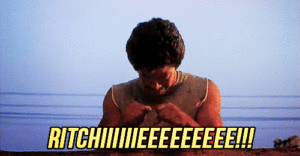
The film “La Bamba” written and directed by Luis Valdez, known to be the founder of modern Chicano film showcased several themes that we have been reading in our text the last few weeks. The themes of machismo, and family are seen, as well as things like discrimination and gender roles. In one of the opening scenes Valens mother is talking to the farm women and says “I’m tired of being hit by men already,” I knew the theme of machismo would be showcased in this film when she said that. We see the theme of machismo in the film best through the character of Bob, Valen’s older brother. Bob is a tough guy, who initially just wanted to provide for his family and get them out of the campos. We see Bob struggle with alcoholism throughout the film causing him to grow violent, especially towards his girlfriend Rosie. There was also a very triggering scene when Bob basically rapes Rosie after they had an argument and she had locked herself in the room saying she just wanted to get some rest. Bob himself later tells his brother that he basically has to rape Rosie in order to have sex. This is something I felt important to bring up that even though they were in a relationship, consent is still necessary. Rosie even tells Bob is this all you want me for? Referring to sex, and also states that he thinks she’s his love slave that he can kick around. A scene between Bob and Ritchie where they are both fighting, Ritchie punches Bob and says “I’m not Rosie asshole” which he meant that he wasn’t going to allow being pushed around, or being someone he could push around. Both Rosie and Valen’s mothers showcase gender roles that women had to be the ones cooking and cleaning, but Valen’s mother also went to work which is untraditional as we have seen in our readings of Next of Kin, as women were supposed to stay at home and take care of the children. There was a scene in which Rosie looked at a pile of dirty plates stacked high in disappointment because of course she was the one who was going to have to wash the plates. We’ve also been reading in Next of Kin the importance of family unity in the movement and we see this theme in the film. The family was really close regardless of the drama, they all came together to help Ritchie in a scene when the whole family is gathered around making posters and then going around town spreading the word of his concert. When Valens music producer ask him to pick what’s most important to him music or his friendship he says family. At the end of the film we even see him making up with his brother and both of them saying “I’m still your brother”. Family is essential in Chicano culture. The theme of discrimination was see with Donna’s disapproving father, I thought it was hilarious when he asked his daughter of Ritchie was Italian. I think Donna’s father’s disapproval was both being that Ritchie was Chicano and because of his class status, because he was poor. This made me think to my personal life, I’ve been in a relationship with a gringo for two years and his father still disapproves, which is really sad. His dad is extremely racist and hates Mexicans which has caused issues in our relationship and unfortunately I don’t have a strong bond with his side of the family due to it, but luckily my family is accepting and has welcomed him into our family. I had never seen this film before, and didn’t know too much about Ritchie Valens but I really enjoyed the film and the music. At the end of the film it made me reflect and think about the huge contribution that Ritchie Valen left on the Chicano community after just 8 months of his rock and roll career. I think about Selena and the huge contribution she left for Chicanas and how both of these artist are still a big part of the community. It makes me wonder what more they could have offered to the Chicana/o community.
